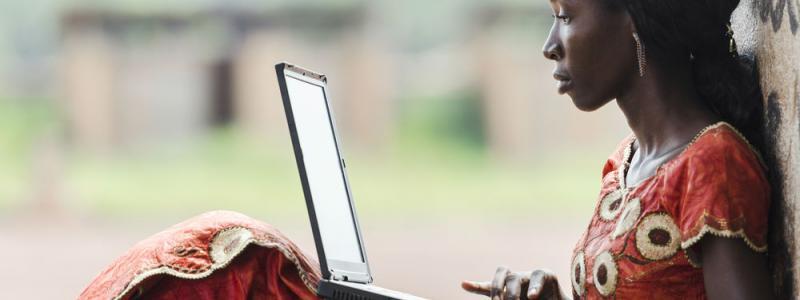Huawei Breaks Ground on Guinea's First High-Speed Fiber-Optic Network

Deep in the heart of a remote area of the West African nation of Guinea, engineers and officials from China's telecommunications giant Huawei gather to break ground on the nation's very first fiber-optic cable. When the project is completed in 2017, millions of people in Guinea will be able to benefit from high-speed and low-cost access to the Internet.
Huawei executives explained that the Guinea high-speed fiber-optic cable will extend over 4,000 kilometers (about 2,500 miles) and will also serve as a hub for other neighboring West African nations. According to Huawei engineers, the fiber-optic cable will feature a total of 77 exchange points where internet coverage can branch off, vastly expanding the total access coverage.
Currently, about half of the people in Guinea have mobile phones, but only a reportedly 2 percent report have regular access to the internet. The Chinese telecommunication giant's ambitious fiber-optic project in West Africa is expected to cost a total of $238 million American dollars and is financed largely by the Chinese state-run Eximbank.
Most Africans that have internet in this region are dependent on private telecommunications operators, which form a patchy network across countries at best. Government officials in Guinea have announced that they will retain full oversight over the fiber-optic project, and have stated that they will use the abundant internet access to benefit schools, local administration and government departments, businesses, and individuals. Rosy reports from the office of the President of Guinea predict as many as 20,000 jobs could be directly generated from the fiber-optic cable once it is completed and functioning. The ripple effect is expected to bring much-needed secondary benefits to the economy for as many 100,000 people or more.
Right now, a key internet underwater cable known as ACE (African Coast to Europe), which connects a vast network of 23 different countries in West Africa to France and Portugal, also has a function node in Guinea. Government officials in Guinea have stated that their fiber-optic project will first be extended out to the "Mano River Union", a friendly and close-knit group of Guinea and the three neighboring states of Ivory Coast, Liberia, and Sierra Leone. Right now, Sierra Leone and Liberia are in strong need of the benefits of the future fiber-optic cable project because their only access to the internet currently comes via the ACE submarine cable.
Huawei's senior manager in West Africa, Kevin Li, spoke to the press and declared that several countries in the region will also benefit from the fiber-optic project once it is up and running.
"Today, so many of the countries in Africa are dependent on just a few nodes to one or two underwater cables out to Europe, which are sensitive to occasional disruptions and congestion from overuse. Once the Guinea fiber-optic project is done, we at Huawei are proud to announce that we will work with both the Mano River Union and then other neighboring states to extend the benefits of the high-speed fiber-optic cable to individuals, schools, government departments, and others. West Africans will soon have many high-speed and low-cost access points to the internet, and we at Huawei are proud to be a part of that."
Some reports have also stated that Mali, which is a landlocked neighbor unable to connect to the ACE, may, in the future, be extended benefits from Guinea's fiber-optic cable. This high-speed fiber optic network will no doubt change Guinea, but will also vastly change its neighboring nations in Africa. Perhaps with more connectivity, there can be more development and less poverty for the people of West Africa.
Related Blog Articles
- Huawei Now World’s Third Biggest Seller Of Mobile Phones, Per Research Firm
- FreedomPop Raises Another $10 Million In Funding; Looking To Expand In Asia
- Xiaomi Recaptures Title Of Top Smartphone Seller In China In Second Quarter Of 2015
- Sprint Chairman: Network Quality In US Is Bad
- Samsung Outfits Its Smart TVs With Samsung Pay
- Apple Music Now Has 11 Million Trial Users
- AT&T Launches First TV-Phone Plan Deal
- Apple Reports $1.7 Billion In Billings For App Store In July
- Google: Now Restructured Under New Umbrella Company Called Alphabet
- Freemium Music Streaming Revenues To Exceed $1 Billion By 2017, Per Research Firm
Related Blog Posts
- Report: AT&T facilities are used for NSA surveillance program
- Tips for achieving a smartphone detox this summer (or at least for a few days)
- Instagram hits 1 billion users; launches new IGTV video uploading service
- Facebook introduces game shows platform, with live interactive vids
- California Democrats combine two separate net neutrality bills


 Menu
Menu